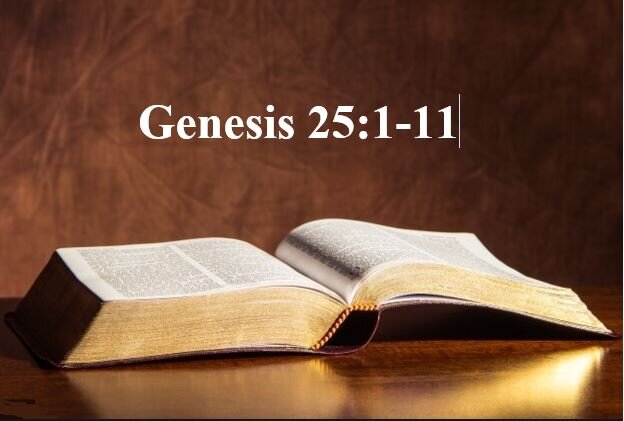BIG IDEA:
THE LEGACY OF A GODLY LIFE REFLECTS THE BLESSING OF GOD
INTRODUCTION:
What type of legacy will you leave behind when you die? What type of legacy does a godly man of faith like Abraham leave behind? Are you looking forward to a retirement life where you will kick back, read in your rocking chair and sip your iced tea? This is not the type of life that Abraham lived in his old age. He continued to have a passion for the will of God. He longed to see a godly lineage established for his son Isaac and his grandsons that would lead all the way to the birth of the promised Messiah.
I. (:1-6) A PRODUCTIVE AND PROSPEROUS LEGACY
A. (:1-4) A Productive (Fruitful) Legacy
1. (:1) Additional Concubine
“Now Abraham took another wife, whose name was Keturah.”
Keturah — Lit. “fragrant smoke”
Parunak: We are not told when Abraham took his third wife, Keturah. It might have been in the 40 years he lived after the death of Sarah, or it might have been earlier. Moses’ concern is not to give us the timeline here, but (as in the Table of Nations in ch. 10) to fill us in on the background of some of the other nations with whom Israel had to do.
2. (:2-4) Additional Offspring
a. (:2) Sons of Keturah Detailed
“And she bore to him Zimran and Jokshan and Medan and Midian and Ishbak and Shuah.”
b. (:3-4a) Sons of Jokshan and Midian
1) (:3) Sons of Jokshan
“And Jokshan became the father of Sheba and Dedan. And the sons of Dedan were Asshurim and Letushim and Leummim.”
2) (:4a) Sons of Midian
“And the sons of Midian were Ephah and Epher and Hanoch and Abida and Eldaah.”
Parunak: Some of these nations (notably the Midianites) later became Israel’s enemies. Moses wants us to remember that these people, like the Ishmaelites, originated with Abraham, and could (had they wished) have retained the knowledge of the truth. But they did not, and thus forfeited their claim to the blessings of Abraham. “They which are the children of the flesh, these are not the children of God: but the children of the promise are counted for the seed” (Rom 9:8).
c. (:4b) Sons of Keturah Summarized
“All these were the sons of Keturah.”
Hughes: By bookending Abraham’s death with genealogical lists, the narrator Moses demonstrates God’s faithfulness to his promises of unnumbered descendants.
B. (:5-6) A Prosperous (Generous) Legacy
1. (:5) Especially Generous to the Son of the Promise
“Now Abraham gave all that he had to Isaac;”
2. (:6) Generous to the Sons of His Concubines
a. Limitation on His Giving
“but to the sons of his concubines, Abraham gave gifts while he was still living,”
b. Protection of Isaac
“and sent them away from his son Isaac eastward, to the land of the east.”
Theodore Epp: Abraham wanted to make it clear to his other sons that Isaac was the chosen son of promise. By giving gifts to the other sons and sending them away, Abraham took the necessary steps to make Isaac’s position free from as many difficulties as possible.
II. (:7-11) A PLEASING (SATISFYING), PEACEFUL AND PERPETUATING LEGACY
A. (:7-8) A Pleasing (Satisfying) Legacy
1. (:7) Quantity of Life
“And these are all the years of Abraham’s life that he lived, one hundred and seventy-five years.”
Teach us to number our days – our life on earth is limited: Ps. 139:16; 90:12; 39:
2. (:8) Quality of Life
“And Abraham breathed his last and died in a ripe old age, an old man and satisfied with life; and he was gathered to his people.”
Parunak: The idea of joining those who have deceased does not mean that they are believers, in heaven. The OT does not distinguish clearly between the destiny of believers and unbelievers after death, the way the NT does. This point is critical for a proper assessment of David’s words concerning his first child by Bathsheba in 2 Sam 12:23, “I shall go to him, but he shall not return to me.” David is not saying that the child is in heaven, but simply that the child is dead.
Constable: quoting Hamilton — It is one thing to live a long life. It is another thing to live a long life that is also a happy life. This obituary notice about Abraham draws attention to the fact that Abraham died not only at an elderly age but in a frame of mind filled with inner shalom and satisfaction. That is the thrust of the phrase “full of days” or “contented.”
Leupold: implies that all wants and all expectations have been satisfied. What 15:15 promised was fully realized.
B. (:9-10) A Peaceful (Restful) Legacy
1. Because of the Love of His Sons
“Then his sons Isaac and Ishmael buried him”
MacArthur: Abraham’s funeral brought together two sons who would perhaps otherwise have remained somewhat estranged from each other (cf. 35:29).
2. Because of the Location of His Grave
“in the cave of Machpelah, in the field of Ephron the son of Zohar the Hittite,”
3. Because of the Lawful Ownership of the Accompanying Field
“facing Mamre, the field which Abraham purchased from the sons of Heth;”
4. Because of the Liason in Death with His Beloved Wife Sarah
“there Abraham was buried with Sarah his wife.”
C. (:11) A Perpetuating (Continuing) Legacy
1. Ongoing Blessing
“And it came about after the death of Abraham, that God blessed his son Isaac;”
Leupold: Transitional paragraph; Outstanding about Isaac from the outset was the fact that God’s blessing was resting upon him. . . Besides, we need to know that Isaac’s more or less permanent dwelling place was the scene of the Angel’s appearance to Hagar, Beer-lahai-roi.
2. Ongoing Possession of the Promised Land
“and Isaac lived by Beer-lahai-roi.”

